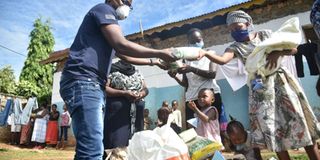Women-led households to benefit from empowerment initiative

Single mothers living with hearing disability receive foodstuff from Hope Foundation Patron Pastor Allan Owano in Mtwapa, Kilifi County in May this year. Single parent households led by women are set to benefit from a government initiative aimed at empowering them economically.
What you need to know:
- Future Bora initiative, funded by World Bank, seeks to engage three organisations running self-employment projects for single parent households led by women.
- Initiative to be implemented under Kenya Youth Employment and Opportunities Project (KYEOP) run by the Ministry of ICT, Innovation, and Youth Affairs.
- Each of the selected three to receive Sh40 million to implement projects expanding economic opportunities for both men and women below 35.
Single parent households led by women are set to benefit from a government initiative aimed at expanding economic opportunities for Kenyans aged below 35 years.
Future Bora initiative, funded by World Bank, seeks to engage three organisations running self-employment projects for single parent households led by women alongside orphans, persons with disability, youth living in the streets, affected by conflict, as well as those from marginalised communities.
The initiative launched virtually on October 22 is to be implemented under Kenya Youth Employment and Opportunities Project (KYEOP) run by the Ministry of ICT, Innovation, and Youth Affairs.
Economic opportunities
Each of the selected three either rural or urban based will receive Sh40 million to implement projects expanding economic opportunities for both men and women below 35.
KYEOP national project co-coordinator, Ms Olivia Ouko said the initiative seeks to enable the targeted groups become employers hence absorbing many more jobless youth.
"Our mission is to ensure the youth do not just create jobs for themselves, but that they are empowered enough to employ their fellow youth, “she said.
ICT and Youth, Chief Administrative Secretary, Ms Nadia Abdalla spoke of sole childcare responsibilities as an impediment to youth's participation in economic activities.
Development projects
She underscored the need for initiatives such as Future Bora that unlock the economic potential of the vulnerable youth.
“Our goal is to empower them (vulnerable youth) through developing favourable policies, job creation and increasing expenditure in development projects, “she said.
UN Women in its Progress of the World’s Women 2019-2020 report urges governments to invest in public services, especially reproductive healthcare, to expand women’s and girls’ life choices.
It notes of the disproportionate social and economic burden single-parent families led by women bear including juggling paid work, child-rearing and unpaid domestic work thereby recommending implementation of gender-sensitive interventions.
Global development
Lack of child care services during the Covid-19 pandemic was one of the reasons women quit their jobs as indicated in the Chatham House The Covid-19 Gender Gap How Women’s Experience and Expertise Will Drive Economic Recovery(2020) strategic action plan.
In the action plan developed after a series of virtual roundtable meetings and workshop with at least 80 global development leaders from public and private sectors, governments are called on to invest in digital training skills for, especially women above 55 to secure their employability beyond the pandemic.
Labour force
“Governments should embed digital, technology and entrepreneurial training as requirements for receipt of unemployment and/or social welfare benefits for women who become unemployed or have had to quit their jobs because of lack of care services," states one of the recommendations in the action
“(This is) in order to up skill or reskill them, and to facilitate their re-entry into the labour force,” it adds, “(And) this is particularly critical for women aged 55 and above, to ensure their continued economic independence and to reduce the burden on social protection programs.”





